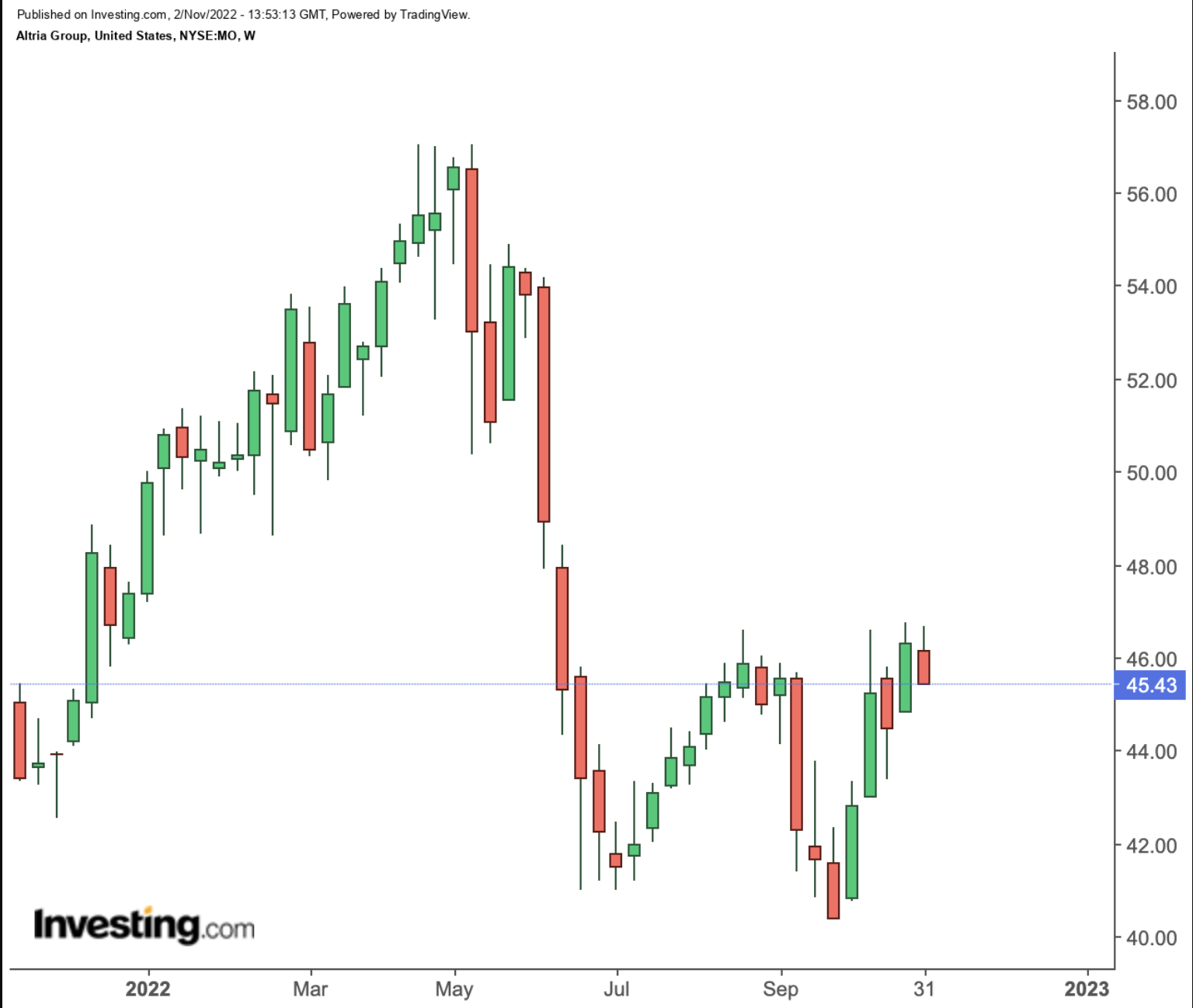ION expands ETF trading capabilities with Tradeweb integration
- On its face, Altria stock looks like a steal, with a dividend yield nearly 9% and a single-digit P/E multiple
- The core smokeable products division continues to drive profit growth, making the valuation more attractive
- But management missteps and looming risks suggest caution — barring a big win in the smokeless space
It bears emphasizing up front: a dividend alone is no reason to buy Altria Group (NYSE:MO) stock. Dividend payments come out of the stock price, after all. And if the business is headed in the wrong direction, a payout of almost any size is not going to save the stock.
That lesson has been taught to investors over and over in recent years, in names like Kraft Heinz (NASDAQ:KHC) and General Electric (NYSE:GE). Even Altria itself is a cautionary tale. The stock’s dividend yield has been above 5% since late 2018. Yet, over the past five years, even including those dividends, shareholders have earned 1.84% — total.
That lackluster performance alone doesn’t mean MO will struggle going forward. Indeed, the company itself has suffered from self-inflicted wounds. Notably, Altria invested $12.8 billion in e-cigarette manufacturer Juul — and now values the stake at just $350 million. A much smaller stake in Cronos Group (NASDAQ:CRON) too failed to pay off.

Source: Investing.com
In fact, while Altria stock has gone nowhere, the underlying business actually has performed rather well. That combination of strong performance and attractive valuation metrics seems to make MO an easy buy here.
That doesn’t quite appear to be the case, however. Right now, Altria looks like a steal. Looking forward, the picture is much more cloudy.
The Smokeable Business
Altria’s strategy beyond cigarettes gets a lot of the press, but it’s still cigarettes that drive current profits. Through the first three quarters of 2022, Altria’s Smokeable Products segment accounted for 86% of the company’s adjusted profit. Nearly all of that comes from Marlboro, which represented 87% of segment volume.
Investors unfamiliar with Altria might be surprised to know that the smokeable products business has grown, particularly given the fact that MO stock has declined in recent years. In fact, based on year-to-date results, operating income in the segment should rise at about a 5% annualized rate over a seven-year period.
That profit growth has come despite the fact that volume has declined at a similar rate. Steadily higher pricing has offset the lower volume, and then some.
And so the clear risk at the moment is that an inflationary environment will lead smokers to quit — or at least to move to lower-priced, discount alternatives. It was that risk that led Morgan Stanley to downgrade Altria stock back in June. And Q3 earnings suggest the risk is real.
In Q3 alone, Marlboro’s market share declined by four-tenths of a percentage point. That’s nearly 1% of the total share achieved in the second quarter (an impressive 43%).
For Altria, the increased regulation around tobacco advertising has actually been a positive. Competitors can’t spend to take Marlboro’s dominant market share. Altria doesn’t have to spend to protect that share.
In that context, it’s not that big of a surprise that Altria’s profit margins have risen steadily higher. But the strategy of consistently increasing prices will have to end at some point. If that point arrives now, Altria earnings start to decline. That decline is precisely what is priced in at the moment.
Moving Beyond Cigarettes
Obviously, Altria management knows the cigarette business is in decline, and that prices can’t go higher forever. That’s why the company spent billions buying stakes in Juul and Cronos. It’s part of why it’s kept its stake in Anheuser Busch Inbev (EBR:ABI).
And the company isn’t giving up on its plans to diversify. Just last week, the company announced a joint venture with Japan Tobacco Inc (TYO:2914) to develop heated tobacco stick products.
Meanwhile, in e-vapor, Altria is terminating its non-compete clause with Juul, allowing it to go its own way in that market.
As Altria’s own chief executive officer put it on the third-quarter conference call, Altria is looking to “lead adult smokers to a smoke-free future.” But the transition is unlikely to be that easy. The JV with Japan Tobacco won’t have a product to even submit to the U.S. Food and Drug Administration until 2025.
Philip Morris International (NYSE:PM) now has the rights to IQOS heated tobacco in the U.S. Its potential acquisition of Swedish Match AB could add competition in nicotine pouches.
The transition to a “smoke-free future” means a transition away from Marlboro cigarettes, one of the most successful consumer products in human history. Under any circumstances, that kind of move is not going to be easy.
But given management missteps so far, and Altria’s inability to show leadership in non-cigarette categories, the transition looks particularly risky.
A high dividend and a low price-to-earnings multiple don’t fix that problem. Rather, they show how serious the market believes that problem is.
Disclaimer: As of this writing, Vince Martin has no positions in any securities mentioned.
